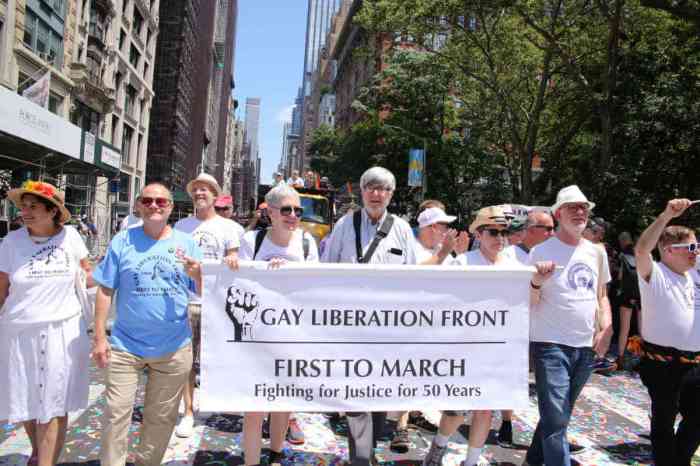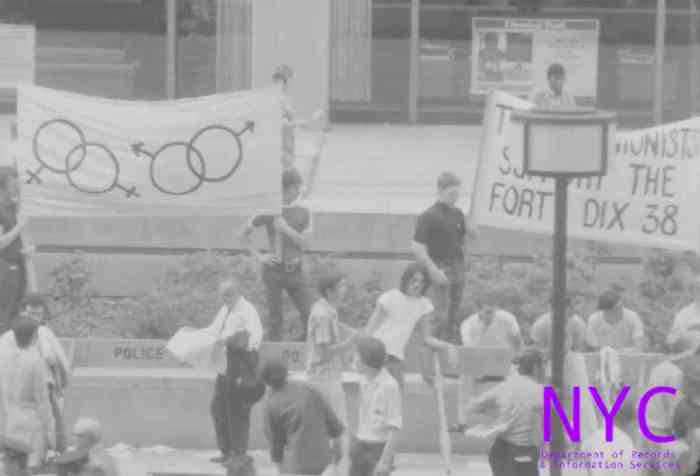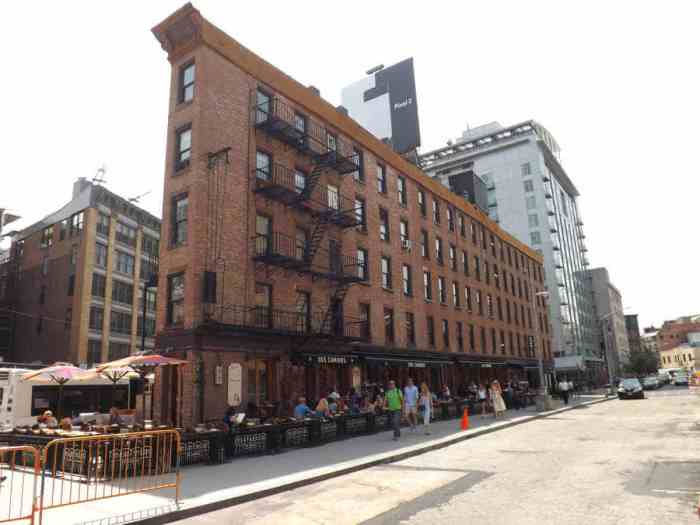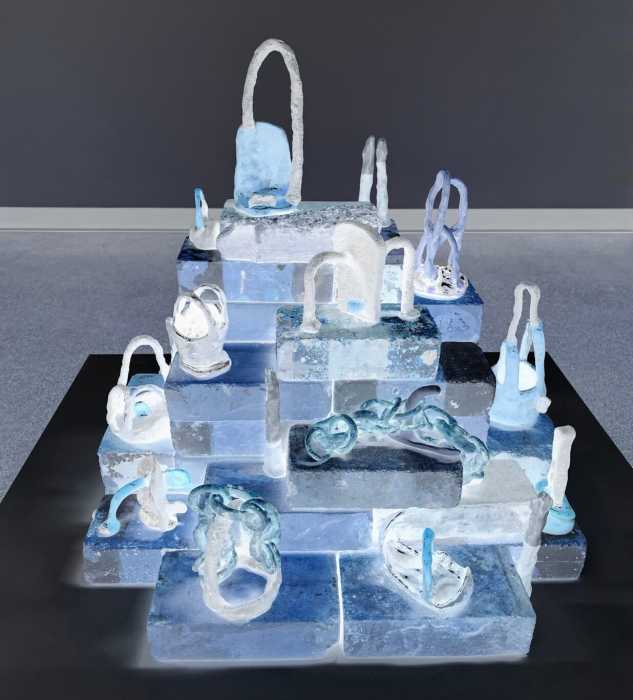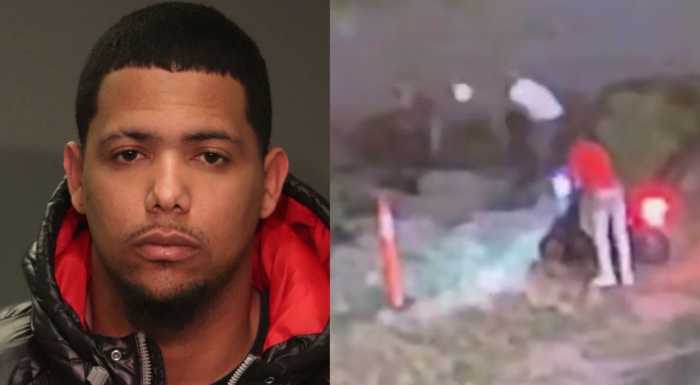Author Edmund White (center) sitting next to Raphael Kadushin of the University of Wisconsin Press. | MICHAEL LUONGO
BY MICHAEL LUONGO | The sixth annual Rainbow Book Fair, billed as the country’s largest gay book event, was held this past Saturday, March 29, at the Holiday Inn Midtown near Columbus Circle.
It’s the fair’s third home, according to Sarah Chinn, a Hunter College professor and the event’s co-organizer. Past locations included the CUNY Graduate Center on Fifth Avenue and the LGBT Community Center on West 13th Street. The renovations underway at the Center occasioned the move to the Holiday Inn, though Chinn acknowledged that the event’s growth was also a factor.
“We needed more space than the Center can provide,” she said, explaining that even using most of its spaces, “we were spilling out.”
Rainbow Book Fair shows strength of a market niche and the community sustaining it
More than 75 tables were sold for this year’s event to more than 110 vendors, Chinn said. Estimates of attendance in past years were as high as 1,500, though, she said, “it’s hard to tell how many people came, but we had a steady crowd from the moment we opened.”
With the move from the Center to the Holiday Inn, costs increased significantly, with space rental rising to $6,000 from about $1,200. A suggested entry fee of $3 was used to defray that spike.
The annual fair, Chinn explained, “brings together publishers, writers, readers under one roof and lets people talk to each other.”
In addition to vendor tables, the six-hour event had readings from dozens of writers, including Edmund White (“Inside a Pearl: My Years in Paris”), Donna Minkowitz (“Growing Up Golem”), Tim Teeman (“In Bed with Gore Vidal: Hustlers, Hollywood and the Private World of an American Master”), Cindy Rizzo (“Exception to the Rule”), and Sean Strub (“Body Counts: A Memoir of Politics, Sex, AIDS, and Survival”). (Full disclosure: this writer read from the Bruno Gmünder book “Sensual Travels: Gay Erotic Stories,” which he edited.)
R. Erica Doyle reads from “Proxy.”MICHAEL LUONGO
A series of in-depth panel discussions explored topics including queer boyhood, the early 20th century gay ex-pat novelist Glenway Wescott, and the poet descendants of Sappho and Walt Whitman. Writers participating on the panels included R. Erika Doyle (“Proxy”), Perry Brass (“King of Angels”), Eleanor Lerman (“Strange Life”), and Charles Rice-Gonzalez (“Chulito”).
Publishing houses on hand for the fair ranged from the niche house Trangress Press, which focuses on transgender issues, to Penguin Random House, whose tables were piled with dozens of books of LGBT interest.
William Johnson, editor of the Lambda Literary Foundation’s website, pointed out the way the fair demonstrates the connections within the queer literary scene.
“It really shows you the sense of community that the LGBT writers have since the Internet, since everything is electronic now,” he said. “It is great to be in the actual presence of people in the writers’ community.”
The staying power of gay publishing in spite a sluggish economy for the past half-dozen years and the decline of brick and mortar LGBT bookstores was on the mind of Don Weise, the publisher of Magnus Books. A veteran of more than 21 years in gay publishing, he said the Rainbow Book Fair is “the one time of the year when you can meet gay publishers all in one room.”
Magnus Books publisher Don Weise. | MICHAEL LUONGO
Acknowledging that gay publishing is a small niche, Weise said of Magnus, “For us personally, the books I’ve worked on matter and there is an audience for these.” Singling out Dr. Gerald Perlman’s “What Every Gay Man Needs to Know about Prostate Cancer: The Essential Guide to Diagnosis, Treatment, and Recovery,” he said, “There is no other book on it, so you become the book that they come to.” One gay man with prostate cancer gifted a copy of the book to his doctor, who seemed uncomfortable with gay patients. “These are not books being done by mainstream presses,” Weise said.
Richard Schneider, editor of the Gay and Lesbian Review, came from Boston to attend the fair.
“This is the one expo in the US where we sell subscriptions to the magazine because it is such a concentration of GLBT readers and writers,” he said. It is more fertile ground for him than either the National Lesbian and Gay Journalists Association’s annual convention or the LGBT Business Expo held each spring at the Javits Center.
Michele Karlsberg, a marketing and management consultant, 25-year LGBT publishing industry veteran, and the publisher of ByWater Books, said she, like Schneider, has been to every fair.
“I was definitely here the first year and it is growing,” she said. “There has been a steady flow in traffic.”
Karlsberg said she was particularly struck by the quantity of self-published writers at author tables.
Among them was Tom Baker, who flew in from California. One of his books is “Full Frontal,” a collection of short stories that he published through iUniverse. Baker described the fair as “a great place to be and to meet with other writers.” Acknowledging that he won’t directly recoup his travel costs, which are entirely out of pocket, he said, “It is hard to put a value on it. It’s an investment.”
Mitch Kellaway, the Transgress Press publisher (right), with his brother Owen. | MICHAEL LUONGO
Larry Closs attended last year’s fair, purchasing an author table to promote his Beat poets-inspired novel “Beatitude,” published by Rebel Satori Press. This year, he represented the publisher at a table with a group of its other writers. Closs said he likes coming to the fair “because so many gay bookstores have closed. I look around and this has taken the place of gay bookstores. There are few places to go where you can see books by LGBT presses.”
Several bookstores, however, held up their banner to prove that queer book spaces have not completely disappeared. Two Lower East Side shops — the feminist and activist-spirited Bluestockings and the Bureau of General Services-Queer Division, which exhibits queer art in addition to selling books — were on hand.
Among the youngest attendees was Faith Brown, 17, a junior at the Hetrick-Martin Institute. The Brooklyn native gave the day’s last reading, a poem she penned on the subway ride into Manhattan. Brown said, “It’s very interesting to be here, with the parties, the talks, the books. People focusing on the art of expression.”
Originally, a group of Hetrick-Martin students was to read, but Brown was the only one who turned out on the rainy day.
“I plan to come next year,” she said.
Timing and other details for the Seventh Annual Rainbow Book Fair will be announced on rainbowbookfair.org. The next major LGBT literary events in New York are the Publishing Triangle Awards on Thursday, April 24 at the Auditorium at the New School (66 West 12th Street; publishingtriangle.org) and the Lambda Literary Awards on Monday, June 2 at the Great Hall at Cooper Union (7 East Seventh Street; lambdaliterary.org).





